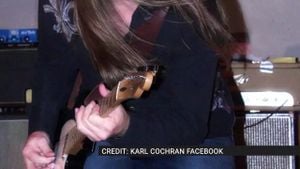The German political scene is heating up as parties prepare for the Federal Election scheduled for February 23, 2025. With significant changes anticipated, the platforms laid out by leading parties are shaping the conversation around key sociopolitical issues.
The Christian Democratic Union (CDU) and its sister party, the Christian Social Union (CSU), are making waves under the slogan, "Politikwechsel für Deutschland" which translates to "Political Change for Germany." This message signals their intention to pivot away from the policies of the previous governing coalition, known as the "Ampel-Koalition," and aims to introduce broad reforms focusing on economic stability, climate action, and revamped migration policies.
The Alternative for Germany (AfD) is touting its urgent agenda underlined by the keyword “Germany,” prominently featured 141 times throughout their program. Their manifesto centers around calls for the country to exit the EU and to reverse many of the EU-oriented policies currently enforced, focusing on tougher immigration controls and the abandonment of the Energiewende, Germany's hallmark energy transition strategy. Their traditionalist stance engages voters desiring stronger national sovereignty and simplified education reforms.
The Social Democratic Party (SPD) presents itself with the slogan, "Mehr für dich. Besser für Deutschland" or "More for you. Better for Germany." This platform aims to integrate responses to social inequalities, directing attention to the economic and security issues exacerbated by external factors, including the Ukraine war, which have become increasingly relevant to voters concerned about national safety.
On the more progressive front, the Greens advocate for social justice and ecological sustainability with their theme of "Zusammen wachsen" meaning "Growing Together." This platform is catchy and emphasizes their commitment to the public by framing their agenda around human-focused policies directly aimed at sustainability and improved quality of life through green initiatives.
Finally, the leftist group known as BSW, led by Sahra Wagenknecht, is vocal about its discontent with the status quo. Their platform criticizes the EU and calls for the end of military support for Ukraine, underscoring the need for accountability and reform in financial policies, particularly surrounding COVID compensations. The BSW is positioning itself for voters seeking radical change to the authoritarian tendencies perceived within current EU governance.
Looking to the center-right, the Free Democratic Party (FDP) enters the conversation with their slogan, "Alles lässt sich ändern" or "Everything can be changed." They are focused on promoting economic freedom, educational reform, and the modernization of bureaucratic processes. With liberty as their keyword—"frei" appearing 132 times—they seek to cultivate support from individuals wanting less government intervention.
Lastly, the Left Party remains steadfast in its commitment to wealth redistribution, advocating for free education, and introducing measures such as the minimum pension of 1,400 euros along with proposals for a four-day work week. Their platform reiterates their pledge to protect the underprivileged and create a more equitable society.
With election day fast approaching, the platforms of these parties indicate the directions they plan to take, each representing distinct visions for Germany’s future. From economic reforms and security measures to environmental sustainability and progressive reforms, the choices presented to the electorate will determine the country’s path forward.
Voter engagement leading up to the election is pivotal, with every ballot counting significantly. The stakes are high: as the trends and rhetoric refine, it will be clear just how important the 2025 Federal Election is for Germany's socio-political fabric moving forward.



